Ultimate Ashwagandha Guide for Athletes: Do You Need It?
Author:
Reviewed by:
(Certified Nutritionist, S&C specialist, M.Sc.Eng. Biotechnology)
Unlock your full potential by engaging with our experts and community! Have questions about your fitness journey or looking for expert advice on weightlifting techniques? Don’t hesitate — leave a comment below and Oleksandr Maksymenko will provide a personalized answer and insights to help you reach your goals.
Torokhtiy is reader-supported. Some links are affiliate links, and we may earn a commission at no extra cost to you. See our disclosure page for details.
Ashwagandha has been the topic of a lot of discussions and it’s created a lot of buzz. Do you need, it, is it just a gimmick, will you waste your money on it, does it have any side-effects… It’s easy to get overwhelmed with information and polarizing opinions.
Ashwagandha is known for its adaptogenic properties and it can help manage stress, improve endurance, even improve the strength of your muscles. Or so people claim. That’s why we’ll dive deep into everything about this ancient herb – we’ll explore the science behind it, what does it really do (if anything?) and how to find the right kind of supplement so you know you’re getting the good stuff.
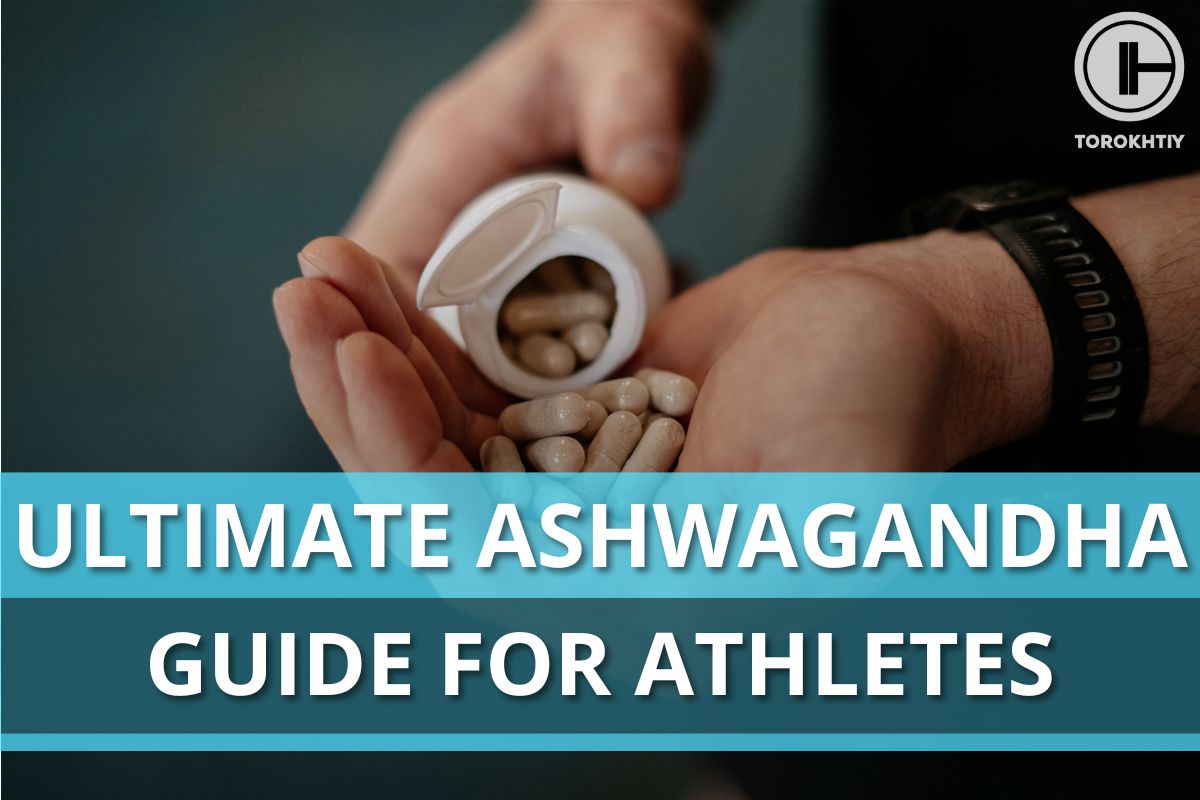
What Is Ashwagandha?
This is an evergreen shrub and one of the most popular plants that came from the Indian alternative medical system – Ayurveda. Ashwagandha is also known as Indian ginseng, Withania somnifera or as Indian winter cherry.
This plant is considered an adaptogen, that is, a substance that may help us adapt to stressful situations and mitigate the effects of stress, which can harm our health and body. Since ancient times, this plant has been used in Ayurvedic medicine as a means to strengthen the nervous system.
However, Ashwagandha is not only considered an adaptogen. Among its proposed benefits are cardioprotective, anti-inflammatory, sedative, antibacterial and other effects.
Ernesto Mendez shared his thoughts:
“Ashwagandha is a traditional herb with adaptogenic properties and versatile applications in modern wellness. It can be used for stress management, enhanced vitality, improved cognitive function, immune support, athletic performance, hormonal balance, sleep quality, and adaptability to chronic health conditions. It may also assist in aging while benefiting both men’s and women’s health.”
The leaves, stem, and root of Ashwagandha contain several bioactive compounds, but the key substance that is primarily responsible for Indian ginseng benefits is the withanolides. It is for this reason that we constantly emphasized their concentration in the supplements included in this review.
However, despite the large body of scientific literature reporting potential ashwagandha’s effectiveness for many conditions and ergogenic effects in athletes, adaptogens in general are not well studied. Many experts are still very skeptical about this type of supplement, especially if you generalize adaptogens as a whole group.
Although, for the sake of fairness, it is worth noting that ashwagandha looks like one of the most promising adaptogens. In any case, given the above, it is too early to draw any far-reaching conclusions about this type of supplement.
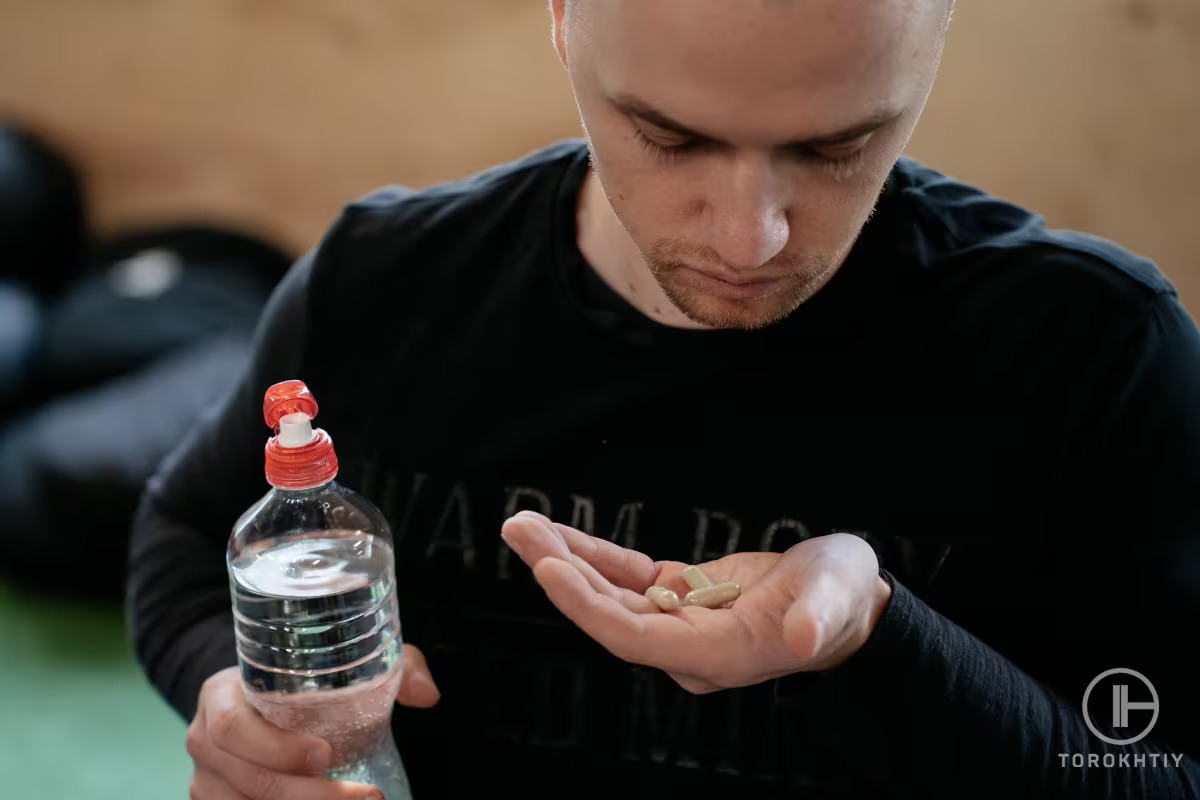
What Are The Types Of Ashwagandha?
Most frequent commercial products used in studies are KSM-66®, Shoden® and Sensoril®. However, not all manufacturers specify which type they use in their supplements, although knowing the percentage of withanolides for each commercial product can at least give you a rough estimate of the absolute concentration per serving.
Some manufacturers do not list neither the types of ashwagandha they use, nor the amount of withanolides per serving. In this case, it is better to choose alternative products, the label of which indicates either the type of ashwagandha or the amount of withanolides per serving. Otherwise it will be very difficult to predict the necessary dosage to obtain the expected effects.
Our expert Dina Al-Rubaye warned you that:
”Ashwagandha, an adaptogenic herbal supplement, offers stress relief, cognitive support, and increased vitality, but individual responses vary, so consult a healthcare professional before incorporating it into your routine.”
Also, by using a supplement with a non-standardized concentration of withanolides, you are more at risk of exceeding the safe dosage, which in turn can cause unpredictable side effects.
What Benefits Can Ashwagandha Give To Athletes?
There is some evidence to consider Withania somnifera as a potentially ergogenic agent that athletes can use to obtain their specific benefits. According to systematic review and meta-analysis, taking ashwagandha in a dosage of 120-1250 mg per day demonstrated positive effects on strength, power and general athletic performance.
This meta-analysis included trials in which the concentration of withanolides was known (including KSM‑66® and Sensoril®), as well as trials in which supplementation with only the total concentration of ashwagandha (in milligrams), without detailed information on the withanolides content. In any case, the authors of this review indicate the general range of ashwagandha that has shown effects.
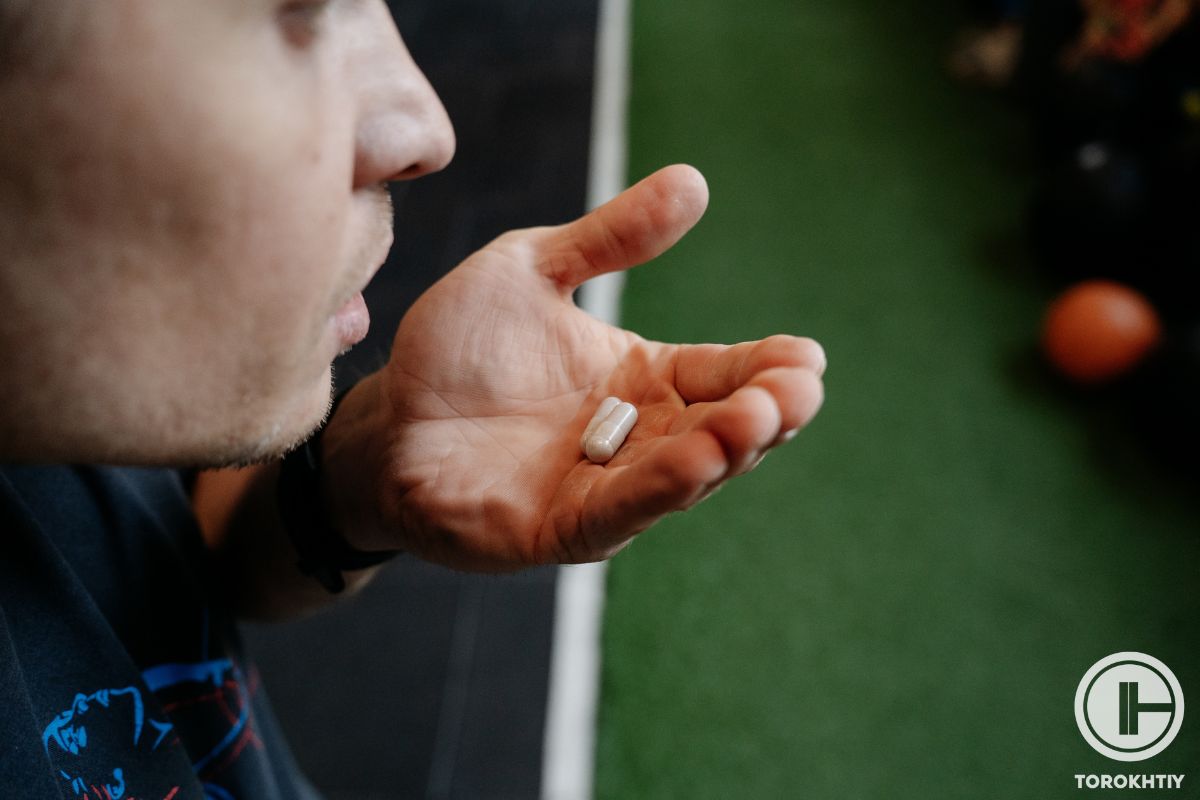
✅ Athletic Performance, Strength and Power
A positive effect was demonstrated regarding muscle strength of upper and lower limbs, handgrip, power and other variables. In experiments that demonstrated effects specific to strength, power, and overall athletic performance, the general range of ashwagandha intake was 500-1250 mg.
For healthy untrained people with no training experience, as well as for those who train infrequently and not very intensively, strength / power-related variables may improve with a dosage of 240-600 mg of ashwagandha per day (even ≤300 mg once a day may be sufficient).
For those undergoing strenuous resistance or endurance training, as well as for athletes, a higher dosage may be needed. Taking ashwagandha twice per day at a dosage of 300-500 mg – in the morning and before going to bed – seems to be safe and effective.
✅ Ashwagandha For Muscle Growth
In this randomized controlled trial, taking 300 mg of ashwagandha 2 times a day demonstrated significantly better changes in muscle size in the arms and chest compared to the placebo group. Therefore, in combination with strength training ashwagandha supplement for muscle growth can potentially give some additive muscle-building effect.
However, additional experiments are needed to confirm these effects.
✅ Ashwagandha for Weight Loss
In the trial cited above, the experimental group that consumed two KSM-66 ashwagandha pills at a dosage of 300 mg, also reduced their body fat percentage by almost 3.5%, while the control group (placebo) – by 1.5%. The duration of the experiment was 8 weeks.
However, it is worth considering that body fat percentage was calculated with the bioimpedance method, which is not sufficiently accurate, since the measurement results can be strongly influenced by the state of hydration.
And although the authors of the study standardized the measurement conditions to avoid a significant influence of the state of hydration, I would still advise against getting too excited.
Remember, that the most effective weight loss tool is a combination of a sustained energy deficit, adequate protein, and a flexible meal plan.
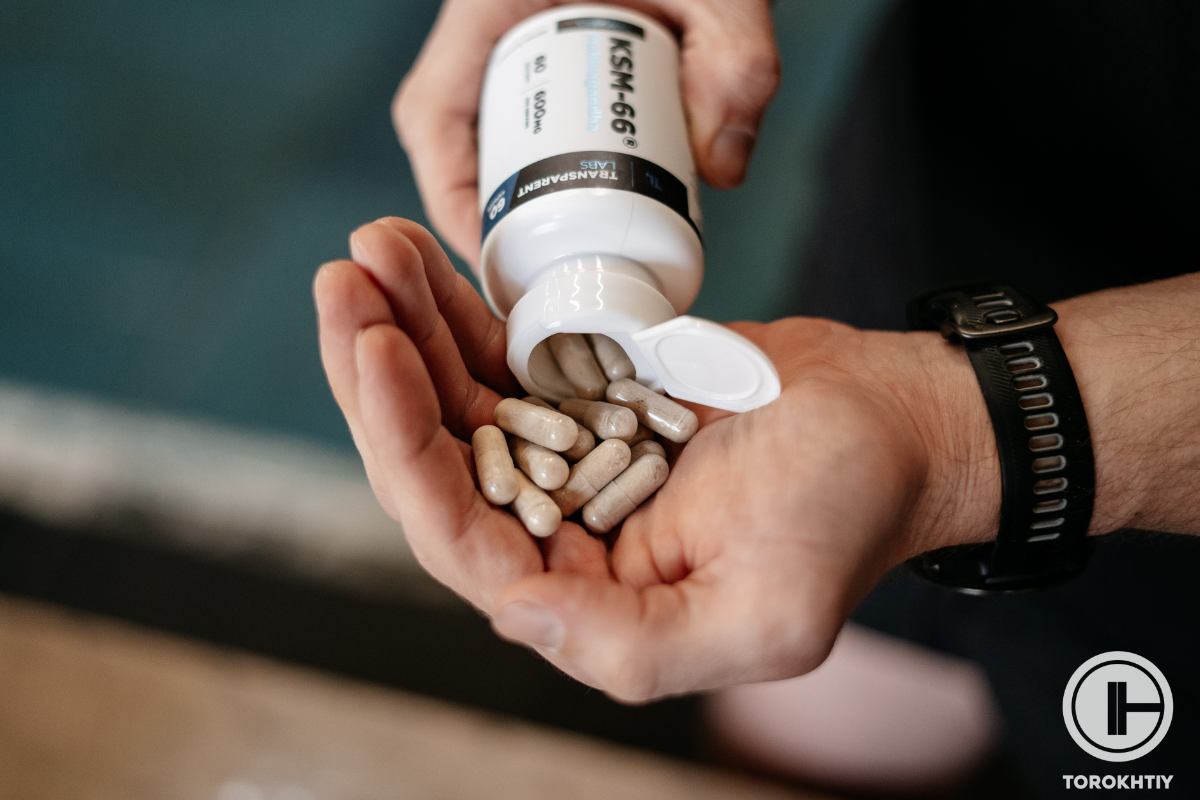
✅ Cardiorespiratory Fitness
The results of the above-mentioned systematic review and meta-analysis also suggest positive effects of Ashwagandha supplementation on cardiorespiratory fitness and more specifically – on VO2max, which is considered the best indicator of cardiovascular fitness and gold-standard measurement of endurance.
In the experiments that demonstrated an improvement in the VOmax2, dosages of 330-1000 mg of ashwagandha were used.
✅ Fatigue, Recovery and Sleep
Ashwagandha showed positive effects on muscle fatigue, muscle damage and soreness. Therefore, in conditions of high volume training, especially high-intensity training, Indian ginseng can contribute to faster recovery and less pronounced muscle soreness.
Ashwagandha also showed a small effect in improving overall sleep. A more pronounced effect was seen in people with insomnia who took 600 mg or more of ashwagandha per day for 8 or more weeks.
Although in this randomized controlled trial, 120 mg in the form of Shoden® was also sufficient to produce an effect in people with non-restorative sleep, which once again emphasizes the importance of withanolides concentration. Among participants in the experimental group, 72% reported improved sleep quality.
✅ Ashwagandha Supplement for Anxiety
The use of this supplement has shown a significant reduction in the anxiety scale. This anti-anxiety effect is associated with a decrease in the activity of the hypothalamic-pituitary-adrenal (HPA) axis, as well as the anti-inflammatory, antioxidant and other effects of Indian ginseng.
Regarding the dosage, a decrease in anxiety was observed starting with 300 mg of ashwagandha.
✅ Ashwagandha for Testosterone
In this systematic review, Withania somnifera was one of two herbal supplements that demonstrated the most consistent increases in testosterone concentrations in men. Among the possible mechanisms that explain this effect are anti-inflammatory and antioxidant properties and a decrease in hormone cortisol, which is inversely correlated with testosterone concentrations.
However, the experiments used different dosages of ashwagandha (240-675 mg per day). Standardization and extraction processes also differed, so we do not have clear recommendations regarding the dosage and type of ashwagandha for testosterone. In women, the effects of increasing testosterone levels from taking Indian ginseng were not observed.
However, despite the possible increase in testosterone, this does not guarantee major changes in the context of the development of muscle mass.
By the way, men with hormone-sensitive prostate cancer should avoid ashwagandha, because increasing testosterone production accelerates the progression of the disease.
Less than 300mg of Ashwagandha:
- Likely too low to produce many significant effects
- May be beneficial for improving sleep
- May prove beneficial in improving strength in untrained individuals
300-600mg of Ashwagandha:
- Decreases in anxiety
- Increased testosterone levels
- Improvements in VOmax
- Improved muscle growth
600-1000mg of Ashwagandha:
- More significant effects on sleep quality
- Improved power and strength in trained indivduals
How To Find Best Ashwagandha Supplement?
To be honest, to understand whether you really need this supplement, whether you have no contraindications, and what type and dosage to choose for your specific task, it is best to consult a doctor. However, below I will outline a few key factors to consider when choosing the decent product.
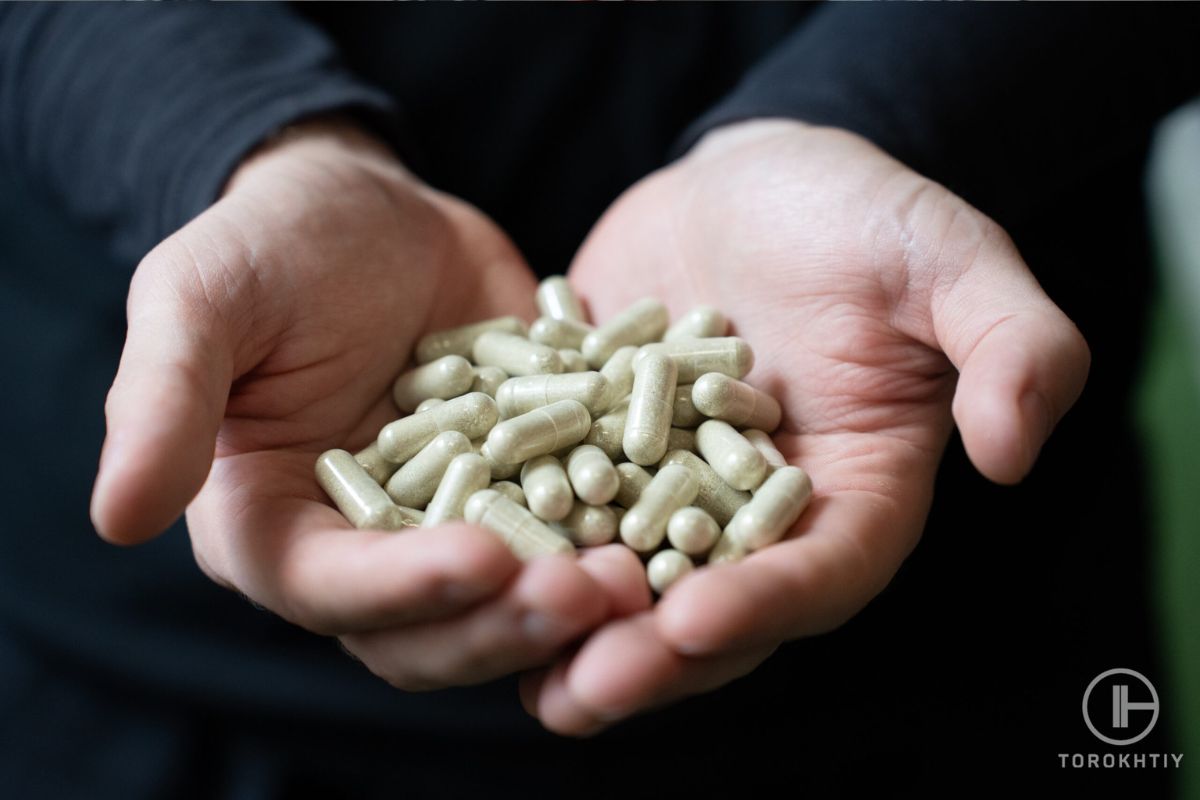
1. Active Components (Withanolides) per Serving
Consider not only the total dosage of ashwagandha, but also the concentration of bioactive substances. For this reason, it is better to choose from products that indicate the specific amount of withanolides per serving. Let me remind you that to obtain the expected effects, the dosage of withanolides should be at least 6 mg.
In addition to the importance of the concentration of bioactive substances, there is also the problem of inconsistency between the declared concentration of withanolides and the actual concentration in a specific product.
In other words, manufacturers may indicate the concentration of bioactive substances (in milligrams), but when tested, it turns out that the actual concentration is much lower than the declared one.
When ConsumerLab reviewed 8 ashwagandha supplements in 2014, only 2 passed the test, demonstrating a quality problem with Withania somnifera products. In the updated review from 2022, out of 16 products 12 received the “Approved” mark.
The rest of the products, including some popular ones you may see in the best ashwagandha reviews, have been labeled as “Unspecified” or “Not Approved” due to insufficient or very low concentrations of withanolides.
2. Testing for Heavy Metals
Many consumers mistakenly think that because herbal supplements are a natural product, they surely cannot harm. However, some herbal supplements contain high levels of heavy metals, including cadmium, lead and other. I don’t think I should explain the consequences of their entry into our body.
For this reason, it is best to prefer supplements that have been tested by a globally recognized third party for heavy metal levels. Pay attention to products that have NSF International, Informed Choice or Informed Sport, Banned Substances Control Group (BSCG) or USP marks. Such products are tested for contaminants and minimize potential risks.
You can also use the ConsumerLab resource, which tests some products for the level of heavy metals, as well as for compliance of the stated amount of the key component of the supplement with the actual amount.
3. Brand Reputation
I also recommend that when considering herbal supplements, you do a little research on brands that have been on the market for a long time and have a good reputation. A good sign is that a particular brand has a large number of products that have been tested by an independent third party.
For example, the leader of this rating certifies many of its products through Informed Choice, including ashwagandha.
On the other hand, although ashwagandha from the Nature Made brand does not have a third-party label, a large part of their products are certified by the USP Pharmacopoeia. This raises the level of trust even in those products that have not been tested, because this brand generally adheres to high safety standards for its products.
KSM-66 Ashwagandha by Transparent Labs
- Ashwagandha per Serving (mg): 600 mg
- Withanolides per Serving (mg): 30 mg
- Servings per Container: 60
- Serving Size: 1 Capsule
- Price per Serving: ~$0.33
- Company Founded (year): 2015
- Recommended by Athletes: Hafþór Björnsson, Paul Sklar, P A U L I N A
One capsule contains 600 mg of ashwagandha extract with at least 5% of the active component – withanolides. That is, for 1 capsule you will get 30 mg of active substances, which is important to consider if you really want to get the effects you expect.
By the way, 600 mg of KSM 66 demonstrated a clinically beneficial effect in improving sleep. Therefore, this product from Transparent Labs may just be one of the best candidates for improving sleep.
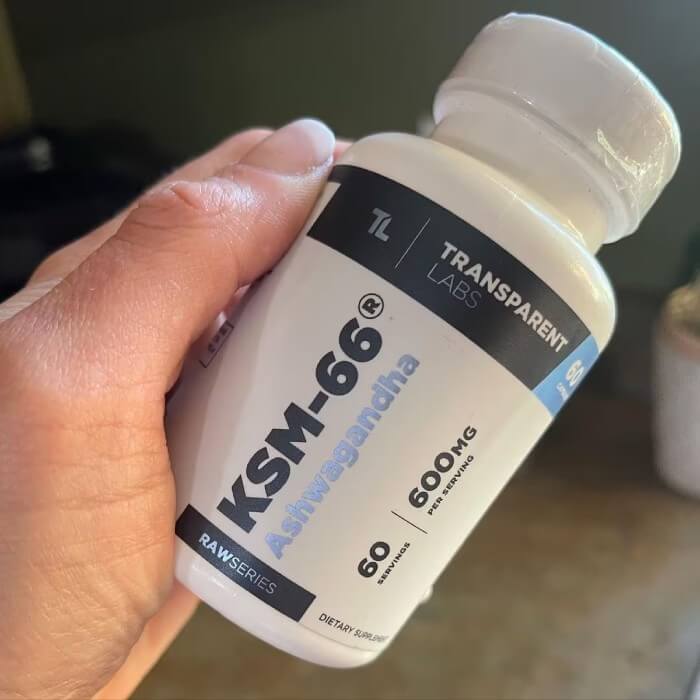
Overall, this product is fantastic because it contains a high concentration of withanolides per serving, has great value for money, and is certified by Informed Choice! Also note that Transparent Labs is a brand with a great reputation.
Contraindications And Possible Side Effects
Indian ginseng is one of those supplements that interacts with some medications and has contraindications. People with autoimmune disorders or thyroid conditions, those who take anti-anxiety, sedative and other medications should be especially careful. In addition, Indian ginseng should be avoided during pregnancy and should not be used while breastfeeding.
Also, keep in mind that this supplement can cause drowsiness, vomiting, stomach upset and diarrhea in some people, and in rare cases, the liver can be affected.
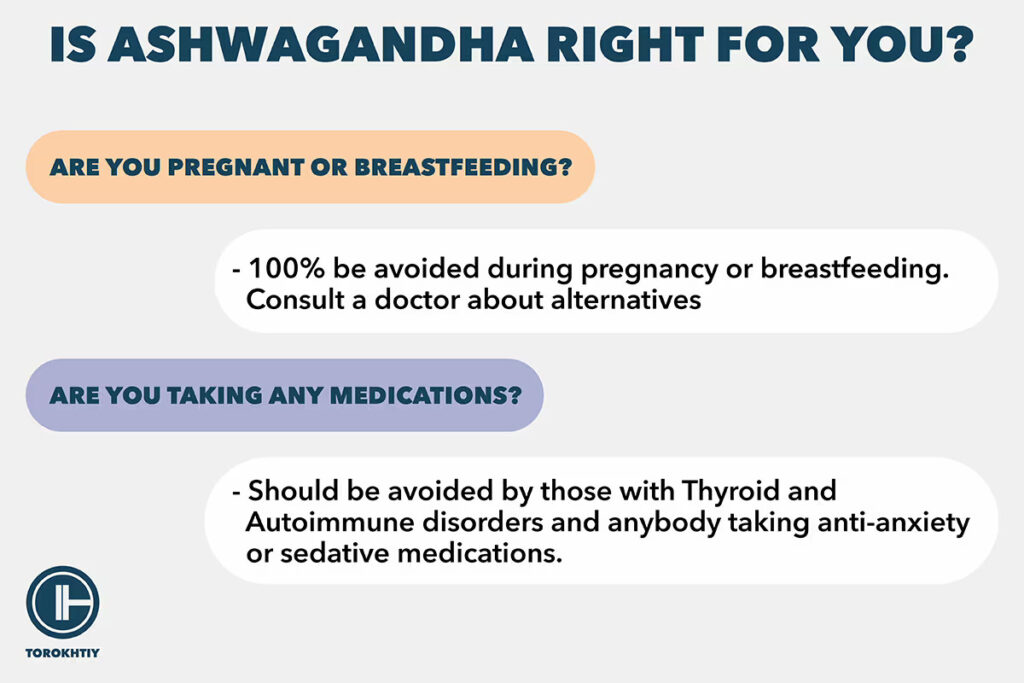
According to the National Center For Complementary and Alternative Medicine, Withania somnifera may be safe when taken for up to three months.
In general, due to the different types of this supplement and the different concentrations of withanolides, the best solution would be to consult a doctor who can give specific recommendations regarding the type and dosage. Without using the recommendations of a professional, you can use either an insufficient concentration of bioactive substances to obtain effects, or vice versa – too high a dosage.
Also, by self-prescribing and using ashwagandha, you can ignore possible contraindications and have a much greater risk of encountering negative side reactions.
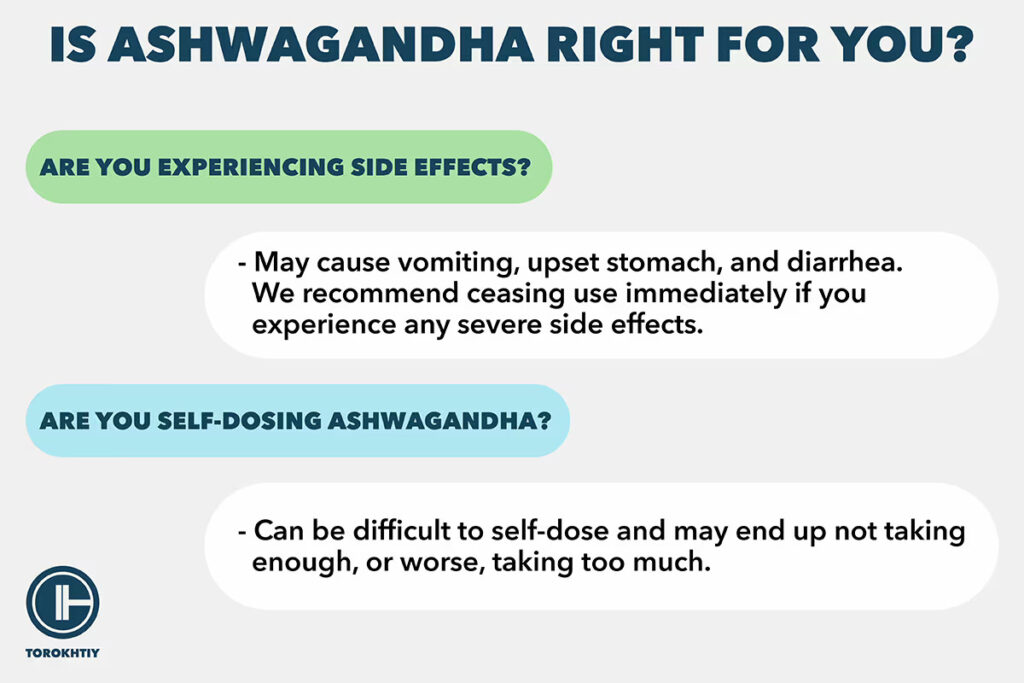
When And How to Take Ashwagandha?
In different studies, this supplement was taken at different times of the day: every morning; in the afternoon or evening; in the evening; or twice daily: in the morning and at bedtime. Therefore, there are no strict recommendations regarding timing.
The most common administration protocol is 600 mg, divided into two doses: one in the morning with breakfast and one in the evening. You need to take the capsule with a glass of water.
Be aware of possible side effects to minimize the risk of nausea, upset stomach, and other gastrointestinal symptoms. Also consider possible drowsiness, especially if you are driving. Therefore, taking into account your goals and tolerance, you may need to adjust the timing of intake accordingly.
For example, if you feel drowsy every time after taking Indian ginseng, you can only take this supplement at bedtime. Another example is if you take ashwagandha on an empty stomach and it always causes gastrointestinal problems, try taking it after a meal or snack.
However, if very severe symptoms appear, it is better to consult a doctor immediately. It is very likely that you will have to completely abandon this supplement. After all, there are many other ways to deal with stress.
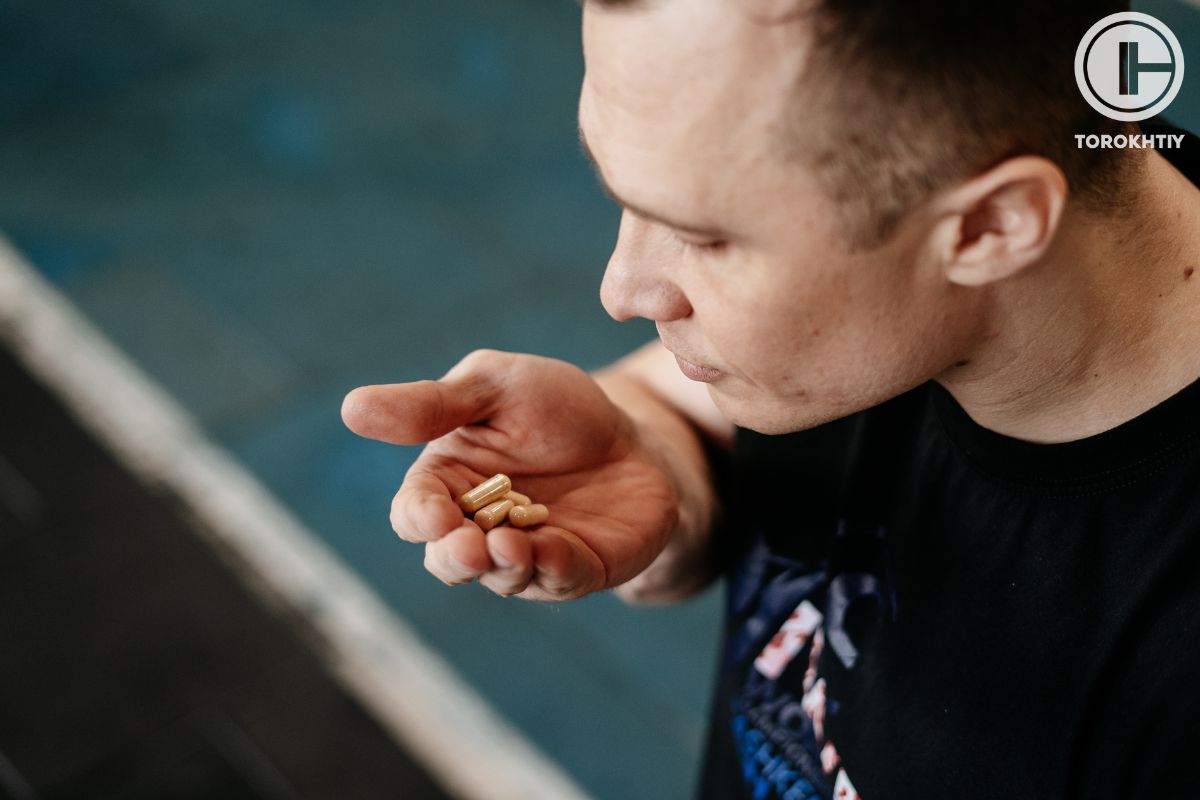
FAQ
Which Ashwagandha Is The Best?
In fact, many products from different brands can fall into the “Best” category. Keep in mind that commercial ashwagandha such as KSM-66®, Shoden®, and Sensoril® are most often used in experiments.
Because these types are standardized (meaning you can see or calculate the concentration of withanolides per serving), many brands use these commercial types in their supplements. In order to choose the best product, use the doctor’s recommendations. This review can be your guide to understanding the important nuances.
Which Brand Is Real Ashwagandha?
There are many brands that offer high-quality Indian ginseng with third-party testing. These are the products selected for this rating, including one of the most studied and best ashwagandha ksm-66. Many products from this review have been tested by ConsumerLab and received approval for the presence of the declared concentration of withanolides.
Does KSM-66 Boost Testosterone?
Maybe. In a systematic review that demonstrated the efficacy of Indian ginseng for testosterone-enhancing effects, participants in experimental groups took different types of Indian ginseng, including ashwagandha KSM-66®. However, once again, this does not mean that the increase in testosterone associated with this supplement will lead to a significant increase in muscle mass.
Is 3000mg of Ashwagandha Safe?
Based on trials, taking a dose as high as 3000mg of Ashwagandha is likely unnecessary. While this is not an unreasonable dose of the whole root, taking 3000mg of an Ashwagandha extract would likely lead to side effects including an upset stomach, vomiting, or even serious health issues.
The strongest product on our list has 1000mg of Ashwagandha per serving, which should be more than enough for most people.
Is It OK to Take Ashwagandha Every Day?
Ashwagandha appears to be well-tolerated for daily use by the majority of people. With that being said, we recommend consulting with a doctor before use to make sure it’s safe for you. If you experience any major side effects with the use of Ashwagandha, stop taking it immediately.
Keep in mind that the longest studies on Ashwagandha were done for around 12-16 weeks and for this reason (safety reasons) we don’t recommend taking it longer than that without taking adequate break.
Conclusion
Among all supplements with adaptogenic properties, Withania somnifera looks like one of the most promising.
However, its mechanisms of action are incompletely understood, so it is too early to draw far-reaching conclusions. Moreover, due to the wide range of possible effects (gaining muscle mass and increasing strength, improving sleep, anti-anxiety effect, etc.), various standardization methods for withanolides and other reasons, it is difficult to give generalized recommendations regarding dosage and timing.
DISCLAIMER
Given all the complexities, the best solution will be to consult a doctor who will take into account the possible risks and be able to give specific recommendations on the dosage and timing of taking ashwagandha. This article is for informational purposes only.
As for our recommendation, we suggest KSM-66 from the reputable brand Transparent Labs as one of the best products on the market. This product contains a high concentration of withanolides per serving, is certified by Informed Choice and has a very affordable price per serving.
Have you ever used this supplement and for what purposes? Share your impressions in the comments!
- Denise Millstine “Can ashwagandha supplements really provide stress relief?” Mayo Clinic Press June 14, 2023 https://mcpress.mayoclinic.org/mental-health/ashwagandha-supplements/
- Kae Ling Cheah “Effect of Ashwagandha (Withania somnifera) extract on sleep: A systematic review and meta-analysis” PLoS One. 2021 Sep 24. https://www.ncbi.nlm.nih.gov/pmc /articles/PMC8462692/
- “Ashwagandha” National Center for Complementary and Integrative Health. March 2023 https://www.nccih.nih.gov/ health/ashwagandha
- “Ashwagandha” National Library of Medicine https://medlineplus.gov/ druginfo/natural/953.html December 06, 2023
- Rampurna P. Gullapalli, Carolyn L. Mazzitelli “Gelatin and Non-Gelatin Capsule Dosage Forms” Journal of Pharmaceutical Sciences. May 13, 2017 https://www.sciencedirect.com/ science/article/abs/pii/ S0022354917300783
- Tod Cooperman “Ashwagandha Supplements Review” ConsumerLab.com June 16, 2018 https://www.consumerlab.com /reviews/ashwagandha-supplements/ashwagandha/
- Paulina Mikulska, Marta Malinowska, Miłosz Ignacyk “Ashwagandha (Withania somnifera)—Current Research on the Health-Promoting Activities: A Narrative Review” National Center for Complementary and Integrative Health. 2023 Mar 24 https://www.ncbi.nlm.nih.gov/pmc /articles/PMC10147008/
- Jonathan Jarry M.Sc “The Problems with Adaptogens” Office for Science and Society Jonathan 9 Jun 2022 https://www.mcgill.ca/oss /article/covid-19-critical-thinking/problems-adaptogens
- Diego A. Bonilla, Yurany Moreno, Camila Gho “Effects of Ashwagandha (Withania somnifera) on Physical Performance: Systematic Review and Bayesian Meta-Analysis” National Center for Complementary and Integrative Health. 2021 Feb 11 https://www.ncbi.nlm.nih.gov/pmc /articles/PMC8006238/
- Diego A. Bonilla, Yurany Moreno, Camila Gho “Effects of Ashwagandha (Withania somnifera) on Physical Performance: Systematic Review and Bayesian Meta-Analysis” National Center for Complementary and Integrative Health. Feb 11, 2021 https://www.ncbi.nlm.nih.gov/pmc /articles/PMC4658772/
- Sachin Wankhede, Deepak Langade, Kedar Joshi “Examining the effect of Withania somnifera supplementation on muscle strength and recovery: a randomized controlled trial” National Center for Complementary and Integrative Health. 2015 Nov 25 https://www.ncbi.nlm.nih.gov/pmc /articles/PMC4658772/
- “VO2 Max Testing” UVA School of Medicine https://med.virginia.edu/exercise-physiology-core-laboratory/fitness-assessment-for-community-members/vo2-max-testing/
- “Exercise Testing” Johns Hopkins Medicine https://www.hopkinsmedicine.org /heart_vascular_institute /cardiology/cardiac-rehabilitation/exercise-testing.html
- Kae Ling Cheah, Mohd Noor Norhayati, Lili Husniati Yaacob “Effect of Ashwagandha (Withania somnifera) extract on sleep: A systematic review and meta-analysis” National Center for Complementary and Integrative Health. Sep 24, 2021 https://pubmed.ncbi.nlm.nih.gov /34559859/
- Abhijit Deshpande, Nushafreen Irani, Ratna Balkrishnan “A randomized, double blind, placebo controlled study to evaluate the effects of ashwagandha (Withania somnifera) extract on sleep quality in healthy adults” National Center for Complementary and Integrative Health. Aug 2020 https://pubmed.ncbi.nlm.nih.gov /32540634/
- “Does ashwagandha affect specific mental health conditions?” Examine https://examine.com/supplements /ashwagandha/faq/ 4J4OOoQ-does-ashwagandha-affect-specific-mental-health-conditions/
- Stephen J Smith, Adrian L Lopresti “Examining the Effects of Herbs on Testosterone Concentrations in Men: A Systematic Review” National Center for Complementary and Integrative Health. May 2021 https://www.ncbi.nlm.nih.gov/pmc /articles/PMC8166567/
- Kamal Patel “Does Ashwagandha Increase Testosterone?” Examine June 7, 2022 https://examine.com/articles/does-ashwagandha-increase-testosterone/
- Lu Luo1, Bo Wang, Jingwen Jiang “Heavy Metal Contaminations in Herbal Medicines: Determination, Comprehensive Risk Assessments, and Solutions” Frontiers in Pharmacology Volume 11 – 2020 https://www.frontiersin.org/articles /10.3389/fphar.2020.595335/full
- Tod Cooperman “Which dietary supplements and health foods contain high levels of lead?” ConsumerLab.com. May 02, 2022 https://www.consumerlab.com/ answers/supplements-and-foods-that-may-be-contaminated-with-lead/lead-contamination-supplements/
- Daryl Nault, Katie Jantz “Ashwagandha” Examine November 2, 2023 https://examine.com/supplements /ashwagandha/
- Photos are made by Torokhtiy Media Team.
Why Trust Us?
With over 20 years in Olympic weightlifting, strength training, nutrition coaching, and general fitness our team does its best to provide the audience with ultimate support and meet the needs and requirements of advanced athletes and professional lifters, as well as people who strive to open new opportunities and develop their physical capabilities with us.
By trusting the recommendations of our certified experts in coaching, nutrition, and sports training programming, as well as scientific consultants, and physiotherapists, we provide you with thorough, well-considered, and scientifically proven content. All the information given in the articles concerning workout programming, separate exercises, and athletic performance, in general, is based on verified data.
The product testing process is described in more detail here.
Author: Oleksandr Maksymenko
Certified Sports Nutritionist,
MSc Sports Dietetics
Specializing in: Weight management, Fitness / Sports nutrition
Oleksandr is a professional fitness nutritionist certified by the Fitness Professional Association (FPA). He follows the principles of evidence-based dietetics and fosters a healthy relationship with food in his clients, ensuring there are no strict prohibitions on their favorite foods or frequent lapses. His primary goal is not only to achieve results for you but also to sustain them over the long term, all while enjoying tasty and delicious food.
Reviewed by: Jacek Szymanowski
Certified Nutritionist,
M.Sc.Eng. Biotechnology
Performance architect,
Strength and Conditioning Specialist
With over 30 years of fighting experience, specialization in nutrition coaching for athletes, and expertise in metabolic health and dietary strategies, Jacek offers a comprehensive approach to optimizing your performance and well-being. Backed by a Master of Science degree in Biotechnology, Jacek remains at the forefront of scientific advancements, ensuring that his coaching is always evidence-based and up-to-date.




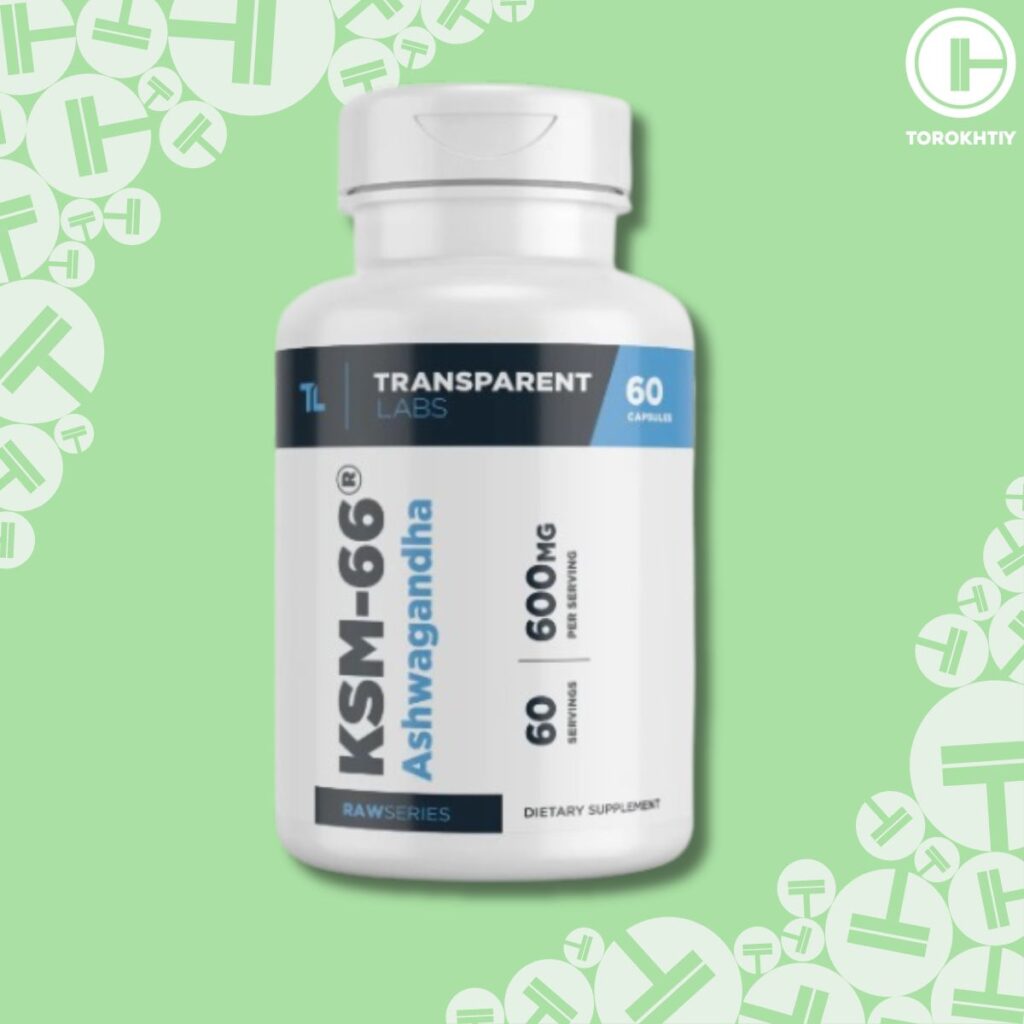
Still have questions after reading our article? Unlock your full potential by engaging with our experts and community! Don’t hesitate — leave a comment below and Oleksandr Maksymenko will provide a personalized answer and insights to help you reach your goals.